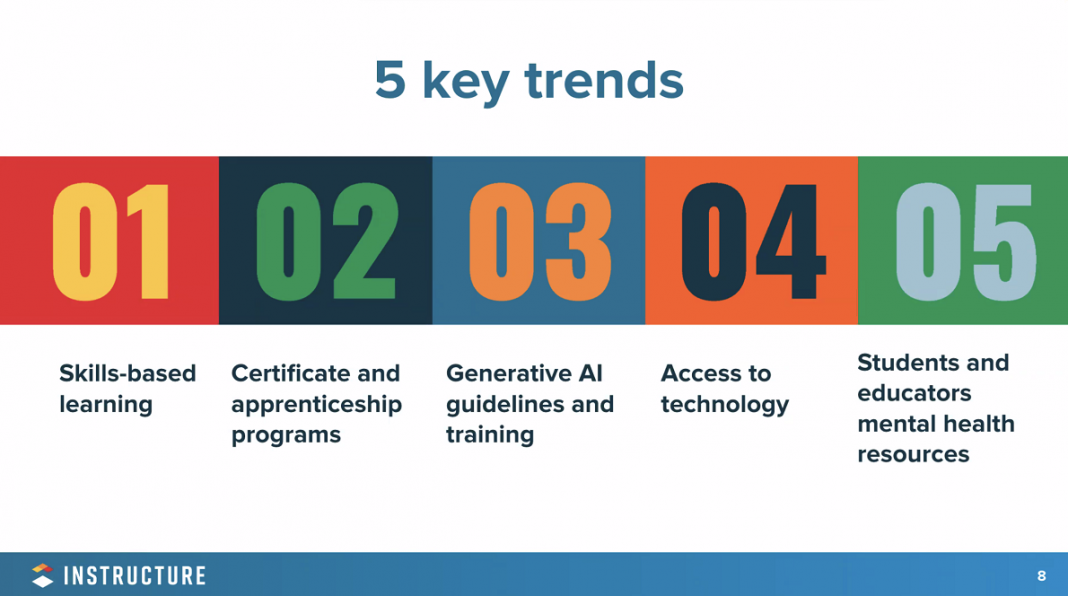In a virtual briefing last Nov. 16, edutech company Instructure, in collaboration with market research firm Hanover Research, released a global study identifying the top five trends they predict will impact learning in Philippine higher education over the course of 2024.
While Instructure’s “State of Student Success and Engagement in Higher Education” report included respondents from 17 different countries, 571 of its participants were students, administrators, and faculty in the Philippines. These Philippine-based participants allowed Instructure to gain insight into the trends shaping the country’s tertiary education.
The five identified trends covered an array of topics, namely, the growing importance of skills-based learning, the legitimacy of certificate and apprenticeship programs, the significance of access to technology in education, the need for generative artificial intelligence (AI) guidelines, and calls for mental health breaks.
First, Instructure highlighted how the demand for skills-based learning is increasing due to its practical applications and its flexibility in the workforce.
The report found that 68 percent of its Asia Pacific respondents placed importance on having proof of skills that they can submit to future employers.
Besides the desire to learn new skills, the edge it gives in the workplace is the primary reason Filipinos invest in skills-based education.
Hopes for career advancement drove 68 percent of Filipino students to pursue of skills-based learning opportunities, 59 percent desired program flexibility, and 56 percent wanted to increase their career readiness.
Relatedly, one method for students to show they mastered skills without spending years on a degree is through certificates or apprenticeships.
Instructure’s second trend centered around how employers are beginning to regard certificates and apprenticeships as demonstrable proof of workplace skills, which is encouraging students to explore this alternate avenue for learning.
This trend is also present in the Philippines, with 43 percent of students likely to consider earning a certificate and 39 percent thinking about undergoing an apprenticeship.
“It’s remarkable how rapidly we’re moving towards this idea that a student will be able to just really demonstrate their skills as opposed to [possessing] a degree,” commented Ryan Lufkin, Instructure’s managing director for Asia Pacific during the briefing.
Harrison Kelly, managing director of the Asia Pacific region at Instructure, added: “This shift highlights the importance of adaptability in educational institutions to offer micro-credentials and programs that align with the expectations of students and employers.”
The next trends revolve around the effect of technology in the classroom. Case in point, the report’s third trend established that access to technology has the greatest impact on student success and engagement.
The data showed that the majority of students state the availability of technology (63 percent) and active use of technology resources (62 percent) to be a major factor in their academic success.
Additionally, 56 percent of respondents believe that access to technology significantly affects students’ engagement with their education.
Providing access to the technology is the first, essential step, but guidance on how to use it empowers students to derive maximum benefits from technology. The need for direction is particularly relevant when considering game-changing generative AI tools such as ChatGPT.
The report’s fourth trend indicated that providing guidelines or training for generative AI as soon as possible to faculty and students could decrease the risk of a skill-development gap.
The need for these guidelines is all the more pressing in the country as both Filipino educators and students are already experimenting with this technology.
Instructure’s study revealed that 62 percent of Filipino educators employ generative AI to create content for their class, 56 percent to facilitate research and writing, and 53 percent to aid personalized learning.
On the other hand, 83 percent of students use generative AI, such as ChatGPT, for research and writing, 52 for test preparation, and 47 percent for foreign language education (47 percent).
Surprisingly, as early as now, Instructure’s found 46 percent of Philippine institutions have provided light guidelines for generative AI use, 46 percent also supplied step-by-step instructions, and 29 percent had strict guidelines for this technology.
“Some of the top universities in the Philippines – among them Canvas users – are already working on ways to address AI responsibly, with a human-centric approach,” Kelly emphasized.
“By offering tutorials and guidance, these institutions are ensuring that this powerful technology is harnessed responsibly by students and educators alike and is used to improve the learning and teaching experience.”
Lastly, Instructure found that due to Covid-19’s ripple effect, prioritizing mental health is becoming a significant trend among instructors and students.
The study found that 40 percent of Filipino respondents would like their institutions to offer mental health days and 37 percent would appreciate mental health apps being made available.
“It’s been a time of incredible change. Just when we got done with the change of Covid, here comes generative AI and it feels like it’s one more thing that’s been disrupted,” explained Lufkin.
“There are times when we need to acknowledge that individuals need mental health days, personal days, to really just take time to decompress and maybe jump off that hamster wheel.”
Instructure pointed out that Filipino institutions are attempting to address the demand for mental health services, as 60 percent of respondent acknowledged that their universities are using Learning Management Systems (LMS), such as Instructure’s Canva, to deliver mental health resources and connect students to in-person events and virtual counselling. Forty-five percent further observed that LMS are being used to promote wellness events.

In short, these varied trends paint a changing educational landscape. Students and teachers are looking for new ways to learn, taking the initiative to explore new educational tools, and demanding a shift in priorities from their institutions.
Instructure is the creator of the LMS, Canva, which is used by schools, including the Philippines’ top four universities — the University of the Philippines Diliman, Ateneo de Manila University, De La Salle University Manila, and the University of Santo Tomas.
Across the more than 100 countries that use Instructure’s services, the Philippines is ranked third in traffic to the Instructure community.




